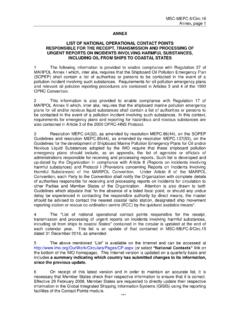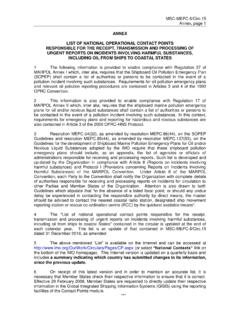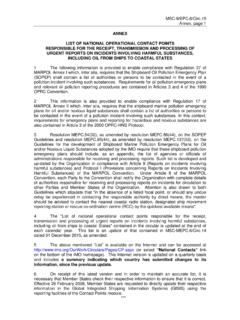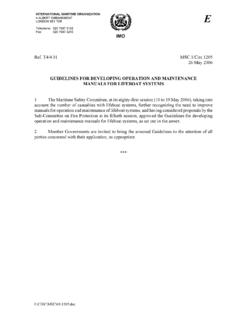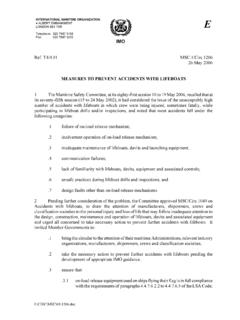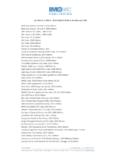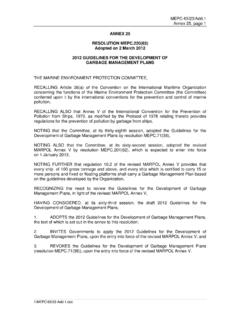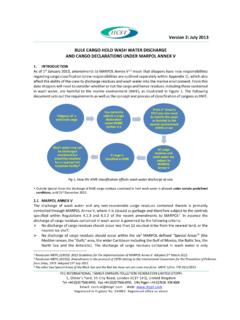Transcription of RESOLUTION MEPC.219(63) Adopted on 2 March …
1 RESOLUTION (63). Adopted on 2 March 2012 . 2012 guidelines FOR THE implementation OF MARPOL ANNEX V. THE MARINE environment protection COMMITTEE, RECALLING Article 38(a) of the Convention on the International Maritime Organization concerning the functions of the Marine environment protection Committee (the Committee). conferred upon it by the international conventions for the prevention and control of marine pollution, RECALLING ALSO that Annex V of the International Convention for the Prevention of Pollution from Ships, 1973, as modified by the Protocol of 1978 (MARPOL 73/78) relating thereto provides regulations for the prevention of pollution by garbage from ships, NOTING that the Committee, at its twenty-sixth session, approved the guidelines for the implementation of Annex V of MARPOL 73/78, NOTING ALSO that the Committee, at its thirty-third session, Adopted the Revised guidelines for the implementation of Annex V of MARPOL 73/78 (the Revised guidelines ) by RESOLUTION (33), which were further amended by RESOLUTION (45)
2 , Adopted at its forty-fifth session, NOTING FURTHER that the Committee, at its sixty-second session, Adopted the revised MARPOL Annex V by RESOLUTION (62), which is expected to enter into force on 1 January 2013, RECOGNIZING the need to review the Revised guidelines in light of the revised MARPOL. Annex V, HAVING CONSIDERED, at its sixty-third session, the draft 2012 guidelines for the implementation of MARPOL Annex V, 1. ADOPTS the 2012 guidelines for the implementation of MARPOL Annex V, the text of which is set out in the annex to this RESOLUTION ;. 2. INVITES Governments, in implementation of the provisions of the revised MARPOL. Annex V, to take into account of the 2012 guidelines for the implementation of MARPOL. Annex V, upon the entry into force of the revised MARPOL Annex V; and 3.
3 REVOKES the Revised guidelines for the implementation of Annex V of MARPOL 73/78 ( RESOLUTION (33), as amended by RESOLUTION (45)), upon the entry into force of the revised MARPOL Annex V. ANNEX. 2012 guidelines FOR THE implementation OF MARPOL ANNEX V. PREFACE. The main objectives of these guidelines are to assist: .1 governments in developing and enacting domestic laws which implement Annex V;..2 shipowners, ship operators, ships' crews, cargo owners and equipment manufacturers in complying with requirements set forth in Annex V and relevant domestic laws; and .3 port and terminal operators in assessing the need for, and providing, adequate reception facilities for garbage generated on all types of ships. In the interest of uniformity, governments are requested to refer to these guidelines and related International Maritime Organization guidance when developing and enforcing appropriate national regulations.
4 1 INTRODUCTION. The revised MARPOL Annex V with an entry into force date of 1 January 2013, prohibits the discharge of all types of garbage into the sea unless explicitly permitted under the Annex. These guidelines have been developed taking into account the regulations set forth in Annex V, as amended, of the International Convention for the Prevention of Pollution from Ships, (MARPOL) (hereinafter referred to as the "Convention"). The purpose of these guidelines is to provide guidance to governments, shipowners, ship operators, ships' crews, cargo owners, port reception facility operators and equipment manufacturers. The guidelines are divided into the following six sections that provide a general framework upon which governments can formulate programmes: Introduction.
5 Garbage management;. Management of cargo residues of solid bulk cargoes;. Training, education and information;. Port reception facilities for garbage; and Enhancement of compliance with MARPOL Annex V.. Comprehensive Manual on Port Reception Facilities, 1999 Edition; (44), guidelines for ensuring the Adequacy of Port Waste Reception Facilities; and , 20 July 2009, Guide to Good Practice for Port Reception Facility Providers and Users guidelines . Under the revised MARPOL Annex V, discharge of all garbage is now prohibited, except as specifically permitted in regulations 3, 4, 5 and 6 of MARPOL Annex V. MARPOL Annex V reverses the historical presumption that garbage may be discharged into the sea based on the nature of the garbage and defined distances from shore.
6 Regulation 7. provides limited exceptions to these regulations in emergency and non-routine situations. Generally, discharge is restricted to food wastes, identified cargo residues, animal carcasses, and identified cleaning agents and additives and cargo residues entrained in washwater which are not harmful to the marine environment . It is recommended that ships use port reception facilities as the primary means of discharge for all garbage. Recognizing that the Annex V regulations continue to restrict the discharge of garbage into the sea, require garbage management for ships, and that garbage management technology continues to evolve, it is recommended that governments and the Organization continue to gather information and review these guidelines periodically.
7 Regulation 8 of MARPOL Annex V provides that Governments must ensure the provision of adequate port reception facilities for garbage from ships and should facilitate and promote their use. Section 5 provides guidelines for these facilities. The Convention provides definitions for terms used throughout these guidelines . Section includes relevant aspects of these definitions, followed by other definitions which are useful for these guidelines . Definitions Dishwater means the residue from the manual or automatic washing of dishes and cooking utensils which have been pre-cleaned to the extent that any food particles adhering to them would not normally interfere with the operation of automatic dishwashers. Grey water means drainage from dishwater, shower, laundry, bath and washbasin drains.
8 It does not include drainage from toilets, urinals, hospitals, and animal spaces, as defined in regulation of MARPOL Annex IV (sewage), and it does not include drainage from cargo spaces. Grey water is not considered garbage in the context of Annex V. Recycling means the activity of segregating and recovering components and materials for reprocessing. Reuse means the activity of recovering components and materials for further use without reprocessing. Application This section provides clarification as to what should and should not be considered garbage under MARPOL Annex V. Ash and clinkers from shipboard incinerators and coal-burning boilers should be considered as operational wastes within the meaning of regulation of MARPOL Annex V, and therefore are included in the term garbage, within the meaning of regulation of MARPOL Annex V.
9 The definition of "operational wastes" (regulation of MARPOL Annex V) excludes grey water, bilge water, or other similar discharges essential to the operation of a ship. "Other similar discharges" essential to the operation of a ship include, but are not limited to the following: boiler/economizer blowdown;. boat engine wet exhaust;. chain locker effluent;. controllable pitch propeller and thruster hydraulic fluid and other oil to sea interfaces ( thruster bearings, stabilizers, rudder bearings, etc.);. distillation/reverse osmosis brine;. elevator pit effluent;. firemain systems water;. freshwater layup;. gas turbine washwater;. motor gasoline and compensating discharge;. machinery wastewater;. pool, spa water and recreational waters;. sonar dome discharge; and welldeck discharges.
10 While cleaning agents and additives contained in hold washwater, and deck and external surface washwater are considered "operational wastes" and thus "garbage" under Annex V, these cleaning agents and additives may be discharged into the sea so long as they are not harmful to the marine environment . A cleaning agent or additive is considered not harmful to the marine environment if it: .1 is not a "harmful substance" in accordance with the criteria in MARPOL Annex III; and .2 does not contain any components which are known to be carcinogenic, mutagenic or reprotoxic (CMR). The ship's record should contain evidence provided by the producer of the cleaning agent or additive that the product meets the criteria for not being harmful to the marine environment .



